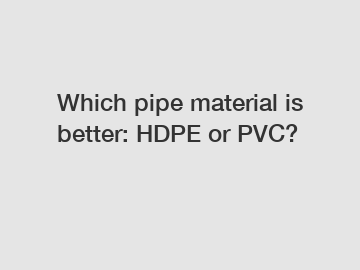Feb. 12, 2024
Rubber & Plastics
Which Pipe Material is Better: HDPE or PVC?
When it comes to choosing the right pipe material for various applications, two popular options that often come to mind are High-Density Polyethylene (HDPE) and Polyvinyl Chloride (PVC). Both materials have their own set of advantages and disadvantages, making it essential to weigh the pros and cons before making a decision. In this article, we will compare HDPE and PVC pipes in terms of their properties, applications, and environmental impact to determine which material is better suited for different needs.
Properties Comparison.

HDPE Pipes:
HDPE pipes are known for their high strength and durability. They are resistant to cracking, corrosion, and leaking, making them ideal for underground applications such as water and gas distribution systems. HDPE pipes have a smooth interior surface, reducing friction and allowing for a higher flow rate. Additionally, they are lightweight, flexible, and easy to install, making them a cost-effective choice for various projects.
PVC Pipes:
PVC pipes, on the other hand, are rigid and strong. They have excellent resistance to chemicals and can handle high-pressure applications. PVC pipes are often used for plumbing, irrigation, and drainage systems. They are known for their smooth interior surface, which results in efficient fluid flow. Furthermore, PVC pipes are easy to cut, join, and install, offering convenience in a wide range of applications.
Applications.
HDPE Pipes:
HDPE pipes are commonly used in a variety of applications, including water supply and distribution, irrigation systems, sewage disposal, and industrial processes. They are highly resistant to chemicals, making them suitable for transporting corrosive substances. Additionally, HDPE pipes are often used in geothermal heating and cooling systems, as they can withstand high temperatures and pressures.
PVC Pipes:
PVC pipes have a wide range of applications, particularly in the construction industry. They are commonly used for plumbing, drainage, and wastewater systems, as well as for cable protection and electrical conduits. PVC pipes are also utilized in agricultural irrigation, as they are resistant to chemicals commonly found in fertilizers. The versatility and durability of PVC pipes make them a popular choice across various industries.
Environmental Impact.
HDPE Pipes:
One of the major advantages of HDPE pipes is their minimal impact on the environment. HDPE is a recyclable material, and many manufacturers use recycled HDPE to produce new pipes. Additionally, HDPE pipes require less energy to manufacture compared to PVC pipes, resulting in a lower carbon footprint. When it comes to long-term sustainability, HDPE pipes are often considered an environmentally friendly option.
PVC Pipes:
PVC pipes, on the other hand, have received criticism for their environmental impact. The manufacturing process of PVC pipes involves the use of chemicals and fossil fuels, contributing to greenhouse gas emissions. Furthermore, PVC is not easily recyclable, and discarded PVC pipes may end up in landfills. It is important to note that some manufacturers have started producing eco-friendly PVC pipes with reduced environmental impact, but their availability and cost may vary.
Conclusion.
Choosing between HDPE and PVC pipes ultimately depends on the specific needs of your application. Both materials have their advantages and disadvantages, and it is essential to carefully consider factors such as strength, durability, application requirements, and environmental impact. If you are unsure which pipe material is better suited for your project, consulting with a professional in the field can provide valuable insights and guidance.
For any further questions or assistance in choosing the right pipe material, please do not hesitate to contact us.
If you want to learn more, please visit our website dredge rubber hose, hdpe and pvc difference, uhmwpe mining pipe factory.
If you are interested in sending in a Guest Blogger Submission,welcome to write for us!
All Comments ( 0 )